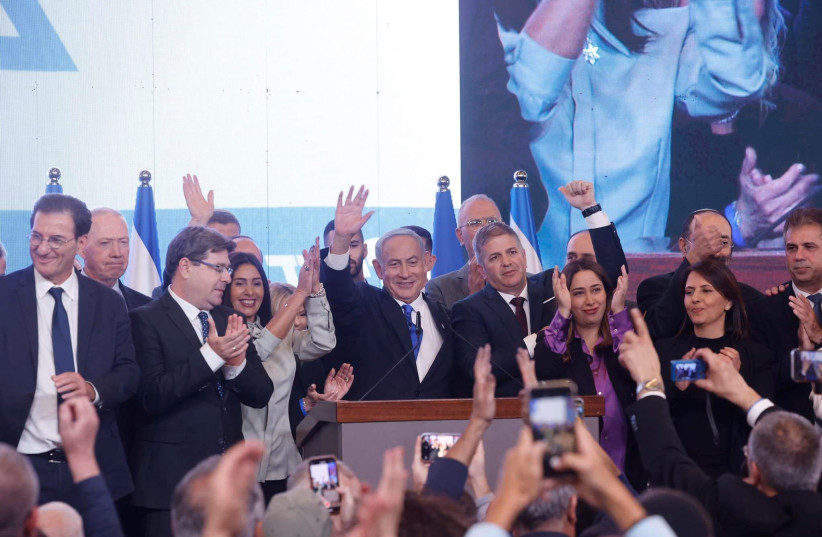Likud leader Benjamin Netanyahu delivered his apparent victory speech early Wednesday morning, claiming that the Israeli public has decided and granted him the victory, according to the Israeli election exit polls.
Netanyahu thanked his supporters for giving him and his bloc a "massive vote of confidence from the Israeli public."
He also said that "it was again shown that Likud is the biggest party in Israel".
Netanyahu also made his intentions clear regarding the coalition he plans to form, as he said that he will form a coalition of the "national camp." He also said that he has spoken with his partners and congratulated them on their success.
Netanyahu demanded that the purity of elections will be kept, perhaps hinting toward a possible difference between the exit polls to the election results.

Netanyahu also said that "the Israeli public voted for national pride and a Jewish state."
However, Netanyahu was cautious and made sure to not claim victory, as the full results are not in yet.
“Israel is returning to sanity today,” former ambassador to the UN and Likud Knesset candidate Danny Danon said. “After years of political instability, the citizens of Israel voted for a nationalist government that will bring back security and governance to the citizens of Israel.”
MK Galit Distal-Atbarian was more circumspect, pointing out that the results are not yet final, and a rumored surge in votes in the Arab sector could mean a tie or a loss.
“I don’t know if we’re standing on safe ground,” she said. “It doesn’t mean we won yet. We have to wait… to see if we win. I’m holding back my joy. I’ll wait a few hours to express my joy safely.”
The event hall Likud rented for election night, bedecked with Netanyahu banners and blue-and-white balloons, was still relatively quiet after the polls closed, with the party jingle playing only once and MKs slowly trickling in.
An hour earlier, Likud announced that they would not be having a celebratory event, usually a sign of pessimism about the poll results.
However, in this case, it seemed more like a tactic to try to drive higher turnout, because Likud insiders said they had a good feeling ahead of the polls closing.
One party staffer said that the 2021 campaign was characterized by a “lack of sobriety [that led] to distraction and complacency,” while this time, “losing [had] a very sobering effect” that has driven higher turnout.
Netanyahu's Gevalt campaign
Despite what appeared to be good numbers for Likud, Netanyahu returned to what has become known as the “gevalt” campaign, traveling around the country.
“Gevalt” is a Yiddish expression of alarm, that has, in recent years, been the name for Netanyahu’s warnings to his supporters in the final days of a campaign that the election is not going their way.
In a series of videos released on social media and to the press, Netanyahu made sure to give off a sense of panic about low turnout, in hopes to get out the vote for his Likud party.
Netanyahu began on Monday, before regular voting even began, with a video on twitter declaring an “emergency.” The polls were at a tie between the right-wing and Center-Left blocs, and now, he said, at a time when actual polls cannot be published, the numbers on his side are going down.
“Right-wing voters are staying home while left-wing voters are going out” to vote, he said, 17 hours before anyone in Israel could actually go out to vote.
The opposition leader began his day voting in Jerusalem, and then visited the home of someone named Oren, an 18-year-old who would be voting for the first time.
Oren was asleep, but that was no problem for Netanyahu, who turned on the light and said, laughing: “Hello Oren!”
Netanyahu told the shocked teen “this isn’t a dream” and he should vote Likud.
“This wasn’t staged!” Netanyahu said as he left the room.
From there, Netanyahu went to the Malha Mall, where people shouted to him as he ascended an escalator and mobbed him as he and his wife Sara walked around.
The get-out-the-vote roadshow continued, from Beit Shemesh to Ashkelon and then Ashdod, and Rishon Lezion, where he stopped by a sushi restaurant to encourage diners to vote.
Then, he continued to Bat Yam, where, his spokesman said, the voter turnout was lower than it is nationally, followed by Netanya.
